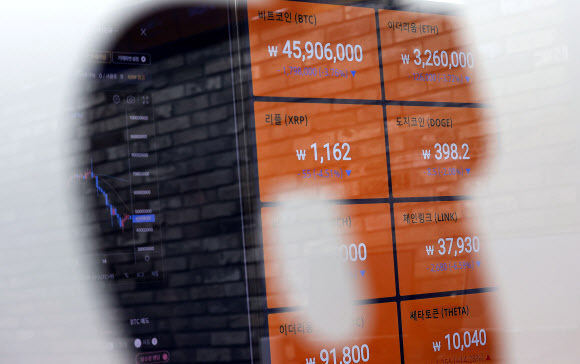 |
A digital board shows prices of cryptocurrencies at Bithumb. (Yonhap) |
Coming under increasing pressure from financial regulators, local cryptocurrency exchanges have hastily delisted dozens of digital coins, but the removals create negative impact on investors, experts said on Friday.
Since Upbit announced its decision to discontinue the trading of five coins on June 11, two more exchange - Bithumb and Coinbit - joined the move with sudden delisting and investment warnings.
“Inadequate digital tokens certainly have to be removed from the market but hasty delistings have negative impact on investors,” Kim Soyoung, an economics professor at Seoul National University, said.
However, when announcing delisting of certain coins, digital asset exchanges offered more or less the same reasons for their decisions and cited their internal standards. They also provided a different range of time for reviewing digital coins flagged as an ”investment warning.”
Coins with an ”investment warning“ can have a grace period until an exchange makes the final decision on its delisting.
The disparity in delisting processes is because there is no legal grounds for the delisting process and each exchange has own standards, according to an official at a cryptocurrency exchange.
Kim pointed out cryptocurrency exchanges must offer detailed standards and clear reasons for the delisting to protect investors and to become more transparent.
The decision of delisting came as financial regulators tighten their grip on cryptocurrency exchanges. In May, the government designated the Financial Services Commission as the main body to oversee the digital asset industry. Earlier in June, the FSC’s anti-money laundering office Financial Intelligence Unit, launched five task forces focused on digital assets.
On Thursday, Bithumb, South Korea’s second-largest cryptocurrency exchange by trade volume, said it is halting trading of four digital tokens listed on its platform. The exchange on the same day issued an investment warning for two coins, which will be given 15-day grace periods in order to make final decisions.
In contrast to Bithumb’s 15-day grace period, Upbit, the country’s largest cryptocurrency exchange, gives a week to the coin issuer to explain, while Coinone offers two weeks.
On Friday, Upbit delisted five coins after it made an announcement a week prior.
On June 11, Upbit said 25 digital coins -- or 14 percent of its total 178 coins -- will be given a week until it makes a final decision on delisting.
Upbit‘s decision sent the prices of the five tokens - Maro, Paycoin, Observer, Solve.Care and Quiztok - plunging more than 70 percent within a day following the announcement.
On the same day, Upbit issued investment warnings on 25 digital coins, or 14 percent of the total 178 coins listed on the platform, meaning that more delistings are expected after the one-week review period ends.
Upbit’s decision was followed by Coinbit, which on Tuesday announced that is discontinuing trading services for eight coins whiling flagging 28 as “investment warning.”
By Park Ga-young (
gypark@heraldcorp.com)


![[Herald Interview] 'Korea, don't repeat Hong Kong's mistakes on foreign caregivers'](http://res.heraldm.com/phpwas/restmb_idxmake.php?idx=644&simg=/content/image/2024/11/13/20241113050481_0.jpg)

![[KH Explains] Why Yoon golfing is so controversial](http://res.heraldm.com/phpwas/restmb_idxmake.php?idx=644&simg=/content/image/2024/11/13/20241113050608_0.jpg)



